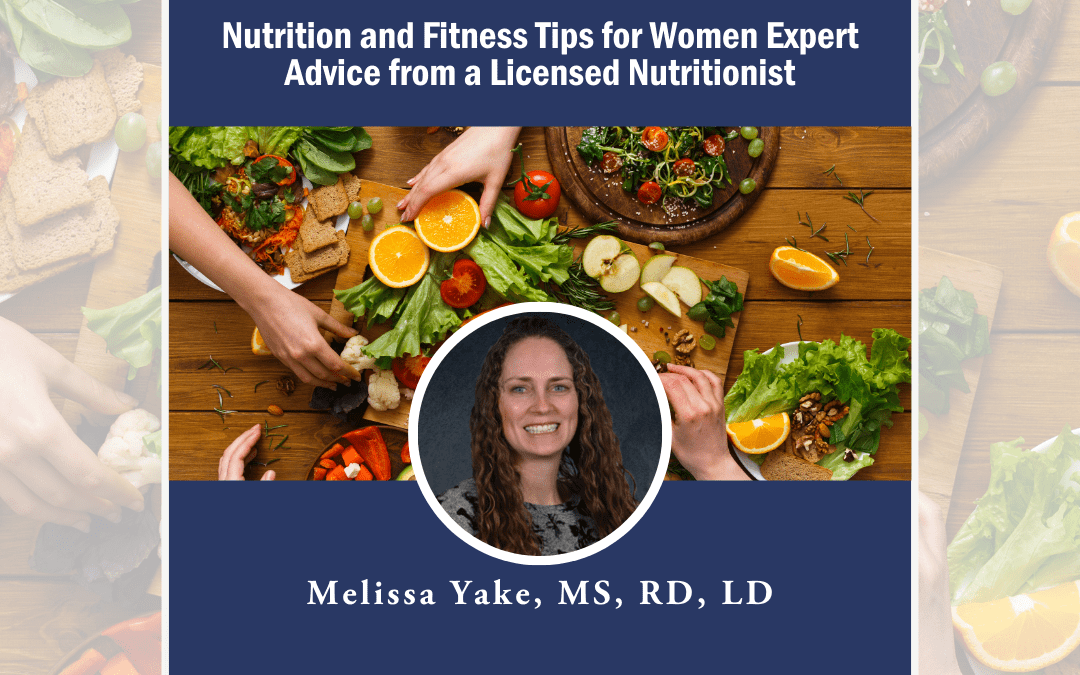Melissa Yake, MS, RD, LD , is a Dietitian at Decatur County Memorial Hospital providing nutrition and weight-management counseling to patients of all ages. Whether navigating chronic conditions such as diabetes or cardiovascular disease, addressing weight concerns, or seeking to deepen your understanding of nutrition, Melissa is dedicated to helping her patients create sustainable lifestyle changes for lasting wellness. Both Yake and other credible sources deliver the following nutrition and fitness tips. You should consult your provider before beginning a new exercise program, particularly if you have any pre-existing conditions or have not been regularly active recently.
, is a Dietitian at Decatur County Memorial Hospital providing nutrition and weight-management counseling to patients of all ages. Whether navigating chronic conditions such as diabetes or cardiovascular disease, addressing weight concerns, or seeking to deepen your understanding of nutrition, Melissa is dedicated to helping her patients create sustainable lifestyle changes for lasting wellness. Both Yake and other credible sources deliver the following nutrition and fitness tips. You should consult your provider before beginning a new exercise program, particularly if you have any pre-existing conditions or have not been regularly active recently.
—

A woman’s body undergoes numerous changes at various stages of life. Whether navigating adolescence, embracing motherhood, or thriving beyond menopause, each phase of a woman’s journey deserves tailored nutrition and fitness care. Whether you’re looking to maintain your energy, manage your weight, or enhance your overall well-being, nutrition and fitness are key pillars in supporting a healthy lifestyle. Here are some expert tips to help you feel your best at every stage of life.

- Focus on Balanced, Whole Foods
Prioritizing a balanced, whole-foods-based diet is essential for long-term health and wellness. This means incorporating various nutrient-dense foods that provide your body with essential vitamins and minerals. Aim to fill your plate with:
-
- Leafy greens: Rich in fiber, iron, and calcium, they’re essential for overall health, especially in maintaining strong bones.
- Lean proteins: Sources like chicken, fish, tofu, turkey, and beans help support muscle health and repair, and are especially important if you’re active.
- Whole grains: Oats, quinoa, and brown rice offer sustained energy and are packed with fiber for digestive health.
- Healthy fats: Incorporate sources like avocado, nuts, and olive oil to help regulate hormones and support brain function.
A well-rounded diet significantly impacts how you feel, helping to stabilize blood sugar, boost energy levels, and support your immune system.

- Tailor Your Fitness Routine to Your Goals
Fitness isn’t “one size fits all.” Your workout plan should align with your personal goals, whether that’s to increase strength, improve flexibility, or manage stress. Here are some exercises and tips to consider based on your needs:
-
- Strength Training: Maintaining muscle mass becomes increasingly important as we age. Incorporate resistance training, like weight lifting or bodyweight exercises (think squats, lunges, and push-ups) to build lean muscle and boost metabolism. Aim for 2-3 days a week to build strength and prevent muscle loss.
- Cardio: Cardiovascular exercise is essential for heart health and overall fitness. Whether it’s a brisk walk, cycling, swimming, or dancing, aim for 150 minutes of moderate-intensity cardio each week. Remember, what matters most is finding something you enjoy so you can stick with it long-term!
- Flexibility and Mobility: Incorporate stretching, yoga, or Pilates into your weekly routine. These practices help improve posture, reduce stress, and maintain joint health, which are all especially important as you age.

- Listen to Your Body’s Nutritional Needs
Women’s nutritional needs can vary greatly depending on factors such as age, activity level, and reproductive health. Here are some additional considerations to keep in mind:
-
- During Menstruation and Pregnancy: Ensure you eat enough iron-rich foods like leafy greens, beans, and red meat to replenish lost iron during your cycle. For pregnant women, prenatal vitamins and extra folic acid are vital for fetal development.
- Perimenopause and Menopause: During these years, fluctuations in hormones can lead to symptoms like weight gain and bone density loss. Focus on foods high in calcium (like dairy, fortified plant milk, and leafy greens) and vitamin D, which helps your body absorb calcium.
- Stress Management: Stress can affect digestion and overall well-being. Eating nutrient-dense foods that stabilize blood sugar levels and include magnesium-rich foods (such as nuts and seeds) can help your body handle stress more effectively.

- Stay Hydrated
Proper hydration is essential for all bodily functions, from digestion to circulation. Drinking enough water can also help with weight management, as thirst is often mistaken for hunger. Aim for at least 8 cups of water daily, and more if you’re active or in a hot climate.
Bonus tip: Add water-rich foods such as cucumbers, watermelon, and berries to support your hydration levels naturally.

- Don’t Skip Breakfast
Breakfast is an important meal that fuels your body after a night of fasting. Skipping breakfast can lead to overeating later in the day and cause energy dips. A balanced breakfast should include protein, healthy fats, and whole grains, like a smoothie with spinach, protein powder, almond butter, chia seeds, or oatmeal topped with nuts and berries.

- Mindful Eating
One of the simplest ways to improve your nutrition is to practice mindful eating. Take the time to enjoy your food, paying attention to hunger cues, eating slowly, and savoring each bite. This practice helps with digestion and can also prevent overeating.

Health, Strength, Empowerment–Starts Here
Nutrition and fitness are foundational to your overall health, strength, and empowerment. Remember, it’s not about perfection, but making small, intentional choices that support your well-being. By focusing on balanced nutrition, a fitness routine tailored to your goals, and listening to your body’s needs, you’re paving the way for the best chance for a vibrant, energized life.
—
If you’re unsure where to start, consider consulting with a Registered Dietitian who can create a personalized plan just for you. Your health journey is uniquely yours, and every step you take is one closer to feeling your best. Health, strength, and empowerment starts here—let’s get moving toward a healthier, happier you!
The information provided in this health insights article is intended for general informational purposes only and is not a substitute for professional medical advice, diagnosis, or treatment. Always seek the advice of your qualified health provider with any questions you may have regarding a medical condition. Don’t disregard professional medical advice or delay in seeking it because of something you have read on this article.

